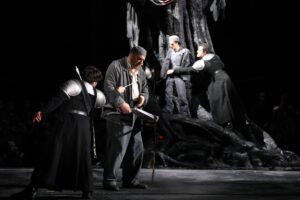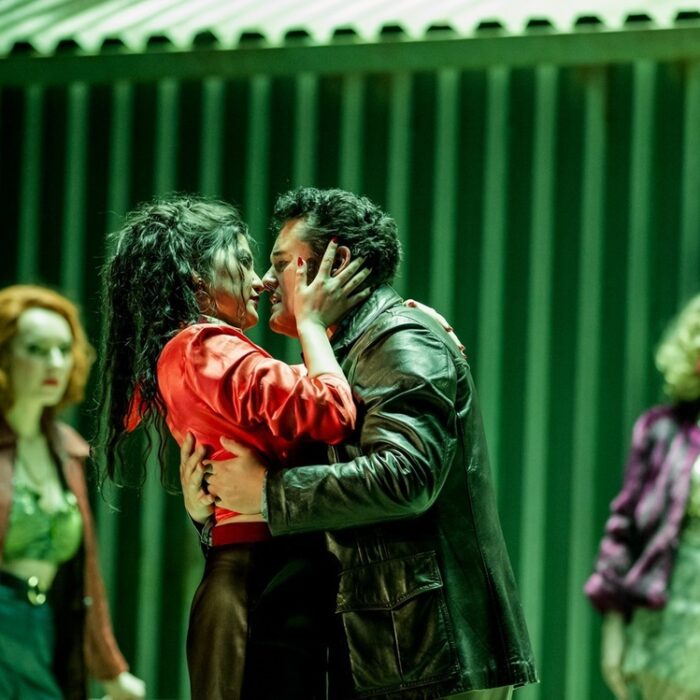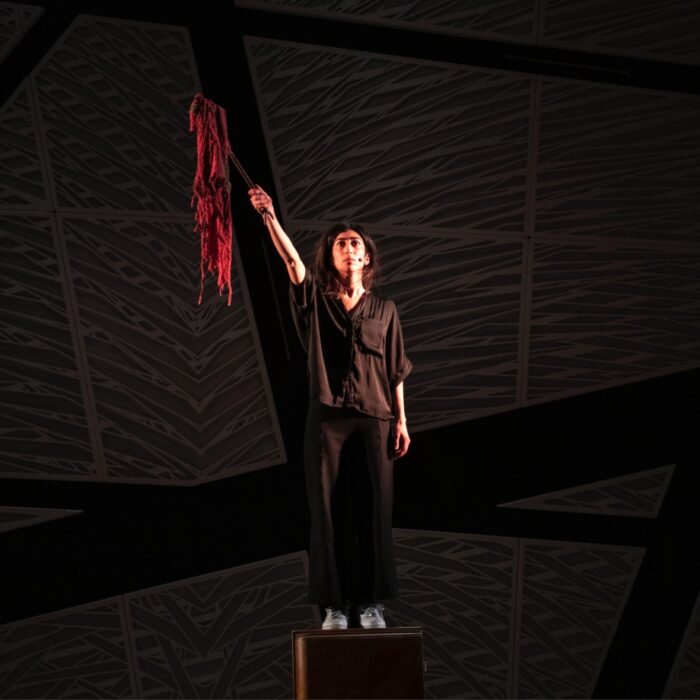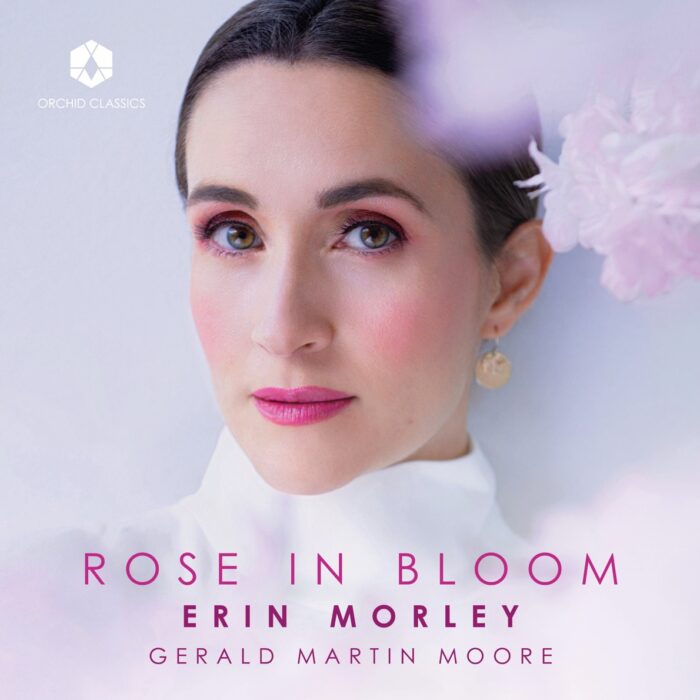
Teatro alla Scala 2023-24 Review: Guillaume Tell
Michele Mariotti & Dmitry Korchak Shine in Chiara Muti’s Dark & Oppressive Production
By David SalazarThe fight for freedom is the human condition.
Throughout her new production of Rossini’s final masterwork at the Teatro all Scala, director Chiara Muti washes the stage in black, establishing a dark, gritty, and eternally miserable world in which the main characters of the drama are in a constant struggle for self-determination. But the forces led by Guillaume and Arnold Melchtal are not just battling for the freedom of Switzerland. The production is rife with imagery that collides past, present, and even a sci-fi future.
A Messy Mélange of Ideas
The all-black stage in Act one features a series of rectangular buildings divided into blocks that allude to a modern high-rise building. The chorus walks around with tablets tied around their necks, the blank white screens seeming to suggest that this technology is both the only light in their life, but also a token of their imprisonment. Later in the opera, we see Gesler’s soldiers donning outfits akin to the Spanish inquisitors. In the final act they march around in metallic outfits that harken back to the middle ages. There’s a moment in the ballet where Gesler forces march around in the vein of Hitler’s army. Arnold’s soldiers grab both guns and swords during his call to arms. And throughout Gesler’s first appearances, he stalks the stage in his red garb like Darth Vader. At one point he even force chokes one of the prisoners. Later in that same Act, Mathilde appears onstage to save Jemmy by waving her arm around like a Jedi Knight, pushing away Gesler’s assailants. Guillaume’s crossing in the final act is marked by a stark shadow play that depicts the Grim Reaper. It’s a mélange of ideas that comes to the apex in the final moment when the prisoners strip their black garbs to reveal white underneath, the white that Mathilde has worn for much of the opera. Meanwhile, the black background of the stage rises to reveal a projection of mountainous forests. It’s overwhelming and coalesces beautifully with the simplicity of Rossini’s final musical act.
But the journey is unfortunately not as fulfilling. The production’s ideas are as jumbled as they sound and are accompanied by a similarly static staging with the actors often standing around, their characters not given much expression or even development. The most striking moment of the staging was undeniably the trio in Act two when Arnold learns of the death of his father. In this moment, the trio comes downstage while the upstage portion is occupied by the torture and murder of Melchtal (in a Christ—like position to boot). And while there are other kinds of business onstage in other moments, little of it feels as potent as this particular moment. In fact, a lot of the times, the staging feels like it relies on staging clichés to get through scenes. The Mathilde / Arnold duet is a perfect example with the two starting on opposite ends of the stage and then eventually coming together for the final bit of the duet, holding one another to each other’s chests. For a relationship as complex that ends on a bit of a cliffhanger, it feels like an uninspired choice that ultimately gets no arc. Ultimately, the staging is very hit-and-miss throughout, creating an uneven pacing accentuated by the length of the piece itself. The choice to do the full ballet in the third Act of the opera doesn’t help matters, especially given that the choreography is a mishap of modern dance practices that don’t always cohere (La Scala’s renowned boo-birds identified themselves profusely following the ballet and continued to make their displeasure for Muti’s production known continuously throughout the night).
While Muti is bold in her approach to tackling the themes of oppression in Rossini’s final work, the lack of coherence ultimately makes the experience similarly oppressive for the audience member to endure.
Main Players
In the title role, Michele Pertusi was the definition of solid. His looming stage presence was always a major point of reference whenever he arrived on the scene, the composure indicative of Guillaume’s resolve. Vocally, he displayed potency in his delivery, every line clear, connected, and brilliant. During the Act two trio “Quand l’helvetie est un champ de supplice,” he sang with rhythmic clarity, emphasizing his power in the scene as he attempted to rally Arnold back into the fight. He was even more emphatic during his big confrontation with Gesler in Act three, his voice more pointed and powerful in its delivery. That sense of poise throughout allowed for the famed “Sois immobile,” when he begs for his son’s life and instructs Jemmy on how to stand for their impending test, to come through with even greater potency. Suddenly, Pertusi, who stood tall throughout, was keeled over, his posture inclined, his voice gentle as he sang over the brooding cello line. The voice retained its brilliant projection, but was now tinged with a mournful color. The higher notes rang with desperation, each phrase more pained than the previous one. Even if Guillaume’s instructions are precise and clear, suggesting composure at the moment, the music, led by Pertusi’s vocalism, suggested his fear. It was a true showstopper of a scene.
Less assured in her performance was soprano Salome Jicia, who had been called in a few weeks back to take over for Marina Rebeka. Things got off to a tremendous start, the soprano owning the stage at the start of Act two during her big scene “Ils s’éloignent.” The first half of “Sombre fôret” showcased Jicia’s voice at its most opulent, projecting gloriously into the hall with a sense of clarity and poise. It was a breath of fresh air after what had proven an unfortunately plodding first Act. She sang with a greater gentleness in the second half, eventually crescendoing to even greater heights by the climax of the aria. But the cadenza’s coloratura runs, which seemed hesitant suggested much of what would happen thereafter. The duet seemed a struggle at times for the soprano. While she managed the notes and rhythms, the voice took on a harshness in the higher range that was further accentuated by her partner, Dmitry Korchak’s sweetness of tone. The coloratura run that bridges the sections was far from precise and the 32nd notes in the second half of the aria lacked similar cohesion. Mathilde returns at the start of Act three and takes on a major presence to end it, having to sing over the massive chorus. Jicia did all she could, but here the harshness was also on display. She managed to restore her initial vocal poise and elegance during the final act, her singing gentle and docile during the duet with Hedwige, the two sopranos matching one another phrase for phrase. In the opera’s final moments, her soprano matched Pertusi’s suavity.
As Arnold, Dmitry Korchak was the undeniable vocal highlight of the night. Where Guillaume knows his purpose and is only forced to question it upon facing the potential loss of his son, Arnold is confused over his duty to his nation and father and his feelings for Princess Mathilde. The tenor’s evening got off to a shaky start with some of the higher notes (the B flats and A flats) in his initial duo with Guillaume, “Ou vas tu,” harsh in their execution. But the tenor rounded into form in time for the big duet that launches Act two, the versatility he has become so renowned for making its appearance in full force. His voice was at its most vibrant during the start of the duet, the A5’s ringing vibrantly during the descending line, each one with greater ardour, emphasizing his passion for Mathilde. From this intensity, his voice turned more gentle at the start of “Doux aveu! Ce tendre langage,” his singing caressing each note. The repeat was even more impressive, the voice pulled back to the most delicate of pianissimo sounds, his vocalism giving the sense of elasticity without ever distorting the rhythm. You could sense the feeling of his Arnold holding onto every precious moment of this scene, relishing in the ecstasy while also knowing that it might not last. It was pure vocal beauty dovetailing with a dramatic bent.
He was arguably more impressive in the trio where the tenor takes centerstage in mourning the loss of his father. Rossini has the tenor ascending up to a B natural several times throughout the trio and forces him to navigate that upper range for longer phrases. The tenor was resplendent here, managing to drive the music forward with heroic virtuosity while also managing to play off his other colleagues. The trio was undeniably the musical touchstone of the entire evening.
Korchak continued to grow into the evening with his Act four aria where Arnold struggles with his resolve following Guillaume’s arrest. He sang with great expansiveness throughout, the high B flats given a natural crescendo that expressed Arnold’s longing for old comforts. In the ensuing cabaletta section, the voice took on a harder edge, but lost none of his luster Korchak called his countrymen to arms throughout “Amis, amis, se condez ma vengeance.” The aria calls for six high C5, with the tenor adding an interpolated one at the end, and Korchak, who had struggled with his high note notes at the start of the night, never sounded more comfortable throughout the night than here where he sang with a sense of poise and presence. It gave both his vocal feats and his characterization of Arnold a complete character arc from hesitance to full-on mastery, the singer truly making the most of the dramatic and musical material offered to him by Rossini.
As the leaders of the warring sides, Evgeny Stavinsky’s Melcthal and Luca Tittoto’s Gesler both showcased sturdy and rigid basses. Catherine Trottmann shone brightly as Jemmy, her soprano sweet with brilliant highs. Meanwhile, Géraldine Chauvet’s interpretation of Hedwige played up her internal conflict of remaining strong in the face of fear while also being vulnerable to the possibility of loss.
The True Star of the Show
The star of the night was undoubtedly Michele Mariotti who led Rossini’s score not only with a sense of composure and confidence, but a clear passion for the music. The iconic overture was passionate and propulsive from its first notes, but the famed final Allegro was most satisfying for the musical risks that the conductor took. He allowed the percussion free rein, giving the piece a muscularity generally never heard. During the B-melody, the violin sixteenth notes were allowed a potent crescendo (both times) that elevated the exhilaration of the piece. And through it all, he slowly but surely pushed the tempo ahead. The audience exploded in much-deserved ovation.
From there, he continued his insightful musical storytelling while also providing incredible support for the singers. I am even reticent to call it support because what he was doing was more akin to chamber music. During the love duet, Mariotti’s orchestra seamlessly followed Korchak’s phrasing, crescendoing with him in one moment before shifting with the tenor’s sudden diminuendo. With the backing of the orchestra, the singer’s phrasing became clearer and was thus allowed greater impact. The same could be observed throughout Guillaume’s Act three aria, the cello solo coalescing with Pertusi’s phrasing to unite them in an expression of the titular character’s emotional anguish.
Another standout moment for me was at the close of the second act where the rebels materialize onstage in phases, the emphatic accents in the orchestra providing tension in the scene. I knew that nothing happened to the rebel forces in this scene, but the phrasing created a sense of dread of what was to come in the next Act.
Finally, the ending. It’s a glorious piece of music and undeniably one of Rossini’s finest moments ever – a repetition of a four-note figure that just builds and builds until it explodes in sublime ecstasy that always proves a glorious moment of arrival in any presentation of this opera. Mariotti emptied the tank here, the orchestra building and building throughout, the singers allowed space to project with clarity. This moment alone redeemed the grueling journey that Muti’s production put us through.


